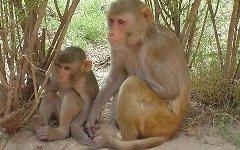992
Scientists have questioned the impact of diet on life expectancy

Biologists recognized 75-year-old thesis that low-calorie diet prolongs life, - only a myth. It is reported by the journal Nature.
During the 23 years of Maryland scientists led Metisson Julie (Julie Mattison) conducted a unique experiment, making objects of study of rhesus monkeys (Macaca mulatta). On average, these primates live 27 years, in rare cases - about 40. Experts pointed to previous studies in which it was found that a low-calorie diet can prolong the life of mammals.
Scientists selected animals were divided into two groups. In the first group of primates I relied very strict diet, which contained only 70 percent of daily calories. Monkeys from the second group were allowed to eat whatever they want. Each group was divided into two populations - young individuals between the ages of 14 and adult macaques from 16 to 23 years.
The researchers examined the overall condition of the animals, blood samples were taken regularly and followed a lifetime of primates, not counting deaths that occurred due to accidents or disease.
As told by biologists, dietary restriction does not impact on life expectancy. Animals, which reduced caloric intake by 30-40 percent, lived an average of as much as other primates. Also, the cause of death did not differ: macaque could die because of kidney disease, vascular heart disease and general decrepitude.
At the same time restrictions have benefited the health of monkeys: those who sat on a diet, are less prone to diabetes and cancer. In addition, the reduced number of blood glucose and cholesterol. This can be explained by the fact that primates in the control group consumed a lot of sugar and semi-finished products, while the "dieters" eating natural products with a minimum of sugar.
Girl disabled invented a chair for diving
The accident at the nuclear power plant "Fukushima" has provoked a mutation butterflies
























